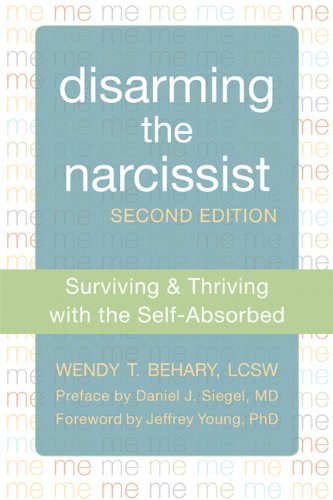
《Disarming the Narcissist》"Understanding and Tackling Narcissism: Key Notes"
1
0

开讲啦 2023-09-06 04:32:46
非常详实。从识别自恋者的表现开始,通过Schema Therapy了解对方和自己的成因,学习通过Mindfulness/Empathic Confrontation来应对四种常见自恋者(The Show-off, The Bully, The Entitled One, The Addictive Self-Soother),什么时候应该离开,以及最后提到7种在这个困难经历中得到的gift。
为这本书做的笔记太长了没法放出来,还是想分享其中我觉得最有用的两点:
1. The following five vignettes will illustrate how to use empathic confrontation with the narcissist in your life. - Differentiating between fault and responsibility Example: "However, it is your responsibility to figure out how to express those feelings without blaming me or putting me down. Doing otherwise is simply unacceptable. This behavior is hurtful to me and to our marriage." - Setting limits Example: "I know you arent used to having people challenge you, and Im not looking to have a debate. Im just respectfully letting you know that this subject isnt open to negotiation. Im sorry if that upsets you. That isnt my intention." "This conversation cant continue if you speak to me that way." - Establishing the rules of reciprocity Example: "If this relationship is going to work, we both need to feel like we matter, like our feelings, opinions, and desires are heard and considered. It sometimes feels like there are different rules for each of us, and that isnt acceptable." - Promoting optimal awareness by providing positive feedback Example: "You know, Rick, Im really grateful for the efforts youre making to be more considerate of me. It really makes me feel closer to you. Thanks again." - Integrating your optimal tool: compassion and raw truth Example: "Listen, Ed, I get that you feel angry. But the way you express it only pushes me away. I dont think you really want to push me away. I think you want me to hear you and to love you. Im only asking that you look behind the anger and tell me about the hurt I can sense as I stand here next to you."
2. The Seven Gifts
1. The art of mutual respect is an expression of the gift of generosity. - Mutual respect entails acknowledging differences between yourself and others without negative labeling. - You accept the narcissists different point of view or preference without becoming critical, defending your position, or discarding your own opinions.
2. The art of self-disclosure is an expression of the gift of courage. - Self-disclosure allows you to unburden yourself of withholding the truth. - Securely attached to your inner strength, you discard your habitual murmur and reveal your fuller, more vibrant experience to the narcissist—without the use of gratuitous insult. This will liberate the possibility for real communication.
3. The art of discernment is an expression of the gift of truth. - When dealing with schemas, which lie at the heart of narcissism and dealing with a narcissist, discernment involves distinguishing between the here and now versus the "there and then." - You acknowledge history without succumbing to it.
4. The art of collaboration is an expression of the gift of shared effort. - Collaboration suggests a collective and invokes the power of "we." In a "we" state of communication, your dialogue is carefully sculpted from the philosophic clay of shared responsibility. - Youre informed by the narcissists extreme sensitivity to feeling defective and ashamed, his fear of being controlled and taken advantage of, and his inability to ask for connection. You know that he can launch into a mode of entitlement, grandiosity, bullying, or avoidance when his schemas trigger those feelings. Because being collaborative keeps finger-pointing impulses at bay, it helps keep the narcissist at ease. - We arent invested in power struggles. The goal of collaboration is to promote an understanding of the issues and find mutually agreeable strategies for change.
5. The art of anticipating clashes is an expression of the gift of foresight. - Anticipating clashes allows you to preempt the predictable pitfalls in your relationship. - In your interactions with the narcissist in your life, you can rebuild the very foundation on which your communications are based. With your newly awakened gift of anticipating clashes combined with some forethought about preemptive measures, you can respond with a secure voice and without blaming, attacking, or sulking.
6. The art of apology is an expression of the gift of responsibility. - A genuine apology places emphasis on compassion for the wounded party, not redemption for the transgressor. - With this gift, youre committed to responsibility for the impacts of your words, sentiments, and behaviors, especially when theyre hurtful. You know that your behavior can serve as a model for how youd like the narcissist to treat you, and you hope for reciprocity. Therefore, you model an apology thats based in a compassionate understanding of how and why certain messages hurt him in the hopes that hell learn how to offer an apology that reflects an appreciation of your sensitivities as well. You express authentically remorseful feelings that are free of self-loathing and a self-centered preoccupation with guilt. You are grounded in the experience of the other person, not focused on a mission of personal redemption. Its less about you than it is about your responsibility.
7. The art of reflective listening is an expression of the gift of balance. - Reflective listening involves mirroring the communication of the other person and extracting hidden sentiments. - You know both how to articulate information and how to put self-interest aside and invite your listener to express himself to you. You are an ardent companion in communication who respectfully and patiently allows others to share themselves with confidence, knowing youll meet them nonjudgmentally. You listen carefully and reflect, without appraisal, an unbiased replay of what you hear in an effort to clarify and validate. And though you may have a different point of view, you wait your turn to express it. - With an awareness of how threatening honest communication can be for the narcissist, you extract hidden meanings and masked vulnerabilities by gently mirroring what you believe remains unspoken. You know that by listening and reflecting, you offer the possibility for mutual discoveries—anything from knowledge about a particular subject to handling controversial matters without getting triggered, or from feelings about each other that have been closeted in danger, apathy, or avoidance to a strength you never knew you had or a realization that the narcissist becomes receptive when he feels heard. - The next item is a bit trickier. You reflect back that perhaps his anger with his associate is partly a displaced anger with himself for not living up to his own high standards. You gently point out that hes very demanding of himself and that this might make it hard for him to tolerate imperfection in others. You successfully resist feeding his insatiable cravings for admiration and instead nourish him with your appreciation for his honesty in communication, his enthusiasm for doing well, and his untiring dedication to his goals, granting him permission to drop his guard and rest his head on your shoulder every now and then.
相关推荐
萤火谷的梦想家
艾莉森•麦吉出生于1960年,是美国《纽约时报》畅销书作家,同时也是大都会州立大学创意写作课的教授。她的作品被翻译成20多种语言并出版,也曾被提名普利策奖,并获得苏斯博士奖金奖、克里斯托弗图书奖、美国 [美]艾莉森•麦吉/[美]克里斯托弗•丹尼斯/绘 2023-03-27 16:50:25鬼马女神捕1·绝密卧底(上)
腹黑凤凰vs毒舌鸡妖——蓝翎:“小姬,跟我去人界吧!”姬十四:“干吗?让人宰了我做小鸡炖蘑菇吗?”蓝翎:“不啊,让妖怪宰了你做小鸡炖蘑菇更气派。”凤凰蓝翎和鸡妖姬十四生活在无忧无虑的灵界。他们的故乡叫 郝天晓 2023-04-17 00:22:47© 2023-2025 百科书库. All Rights Reserved.












发表评价